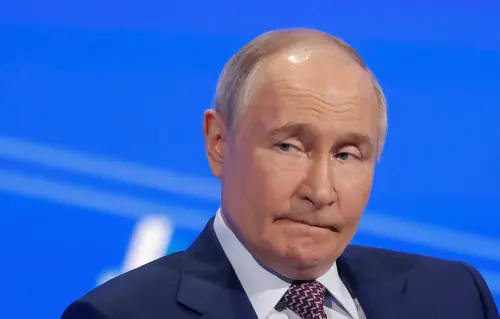Putin has moved closer to his goal of mending Russia's relations with the United States and creating a rift between the U.S. and Europe while offering only limited contributions to peace efforts in Ukraine.
Before the recent discussions between the two presidents, the U.S. indicated it would seek Russia's agreement to a 30-day ceasefire—a proposal that Ukraine accepted in principle—as a preliminary step toward a comprehensive peace deal. However, Putin consented only to a narrower ceasefire where both Russia and Ukraine would refrain from attacking each other for one month.
To ensure that Trump did not leave empty-handed, it was noted as the first time in more than three years of conflict that both sides had been persuaded to scale back hostilities, even temporarily. The White House announced that discussions regarding a maritime ceasefire in the Black Sea, along with plans for a broader ceasefire, would commence immediately.
Halting attacks on energy facilities and at sea would significantly restrict Ukraine, which has dealt considerable hits to Russia's oil infrastructure—an essential source of funding for the war—and its larger navy since the conflict began. Nonetheless, Russia remains free to continue its military operations on land, especially in its western Kursk region, where it aims to eliminate Ukrainian forces that had taken Russian territory in a surprise assault last August.
Putin reiterated Russia's conditions for a broader ceasefire, insisting it should not allow Kyiv to amass weapons or mobilize additional troops. Ukraine has rejected these terms.
Nigel Gould-Davies, a Russia specialist at the International Institute for Strategic Studies, suggested that Putin has effectively dismissed the idea of a wider truce and is unlikely to entertain it seriously unless Trump follows through on threats to intensify economic pressure on Russia through further sanctions.
Trump's aides characterized the phone call as a success and a significant step toward a ceasefire. They highlighted that there was a newfound consensus on crucial aspects, including the ceasefire on energy infrastructure and a moratorium on firing in the Black Sea.
However, Andrei Kozyrev, a pro-Western former Russian foreign minister, argued that Trump achieved little. He asserted that it is in Putin's interest to prolong the conflict and manipulate America.
A Russian source close to the Kremlin indicated that Putin intends to exert pressure on Trump and continue the war, speculating that Ukrainian forces would retreat and gradually lose territory and personnel.
Ukrainian President Volodymyr Zelenskiy expressed readiness to support a moratorium on energy strikes, though shortly afterward, each side resumed attacks. Even if a limited energy ceasefire were to hold, analysts argue it would not signify a major concession from Putin. In exchange for pausing assaults on Ukraine's energy grid, he could gain relief from frequent drone attacks on major Russian oil refineries—attacks that have already disrupted 3.3 million tons, or 4%, of Russia's total refining capacity this year.
Kozyrev remarked that Putin gained nothing substantial by agreeing to an ambiguous energy ceasefire, which deviated from Trump's original request for a complete ceasefire. Instead, this arrangement pertains only to selective targets.
The Kremlin's readout of the call indicated that the presidents promised to continue efforts to end the conflict "in a bilateral format"—an approach that concerns Ukraine and its European allies, who fear Trump may negotiate an agreement with Putin that excludes them and undermines their position.
Additionally, the leaders discussed broader areas for potential cooperation, including the Middle East and nuclear proliferation and security, emphasizing their "special responsibility" to maintain global stability. This aligns with Putin's attempts to restore Russia as a diplomatic equal to the United States, seeking to negotiate on par after years of U.S.-led isolation and economic sanctions.
Political analyst Tatiana Stanovaya noted that this represents a significant success for Putin, as he manages to separate bilateral relations from the ongoing Ukrainian conflict. Gould-Davies added that Putin appears intent on engaging solely with the U.S. to create a fissure between Washington and its NATO allies.
This situation compels Europe to rapidly allocate resources for its own defense while attempting to mitigate the ongoing disconnect.
